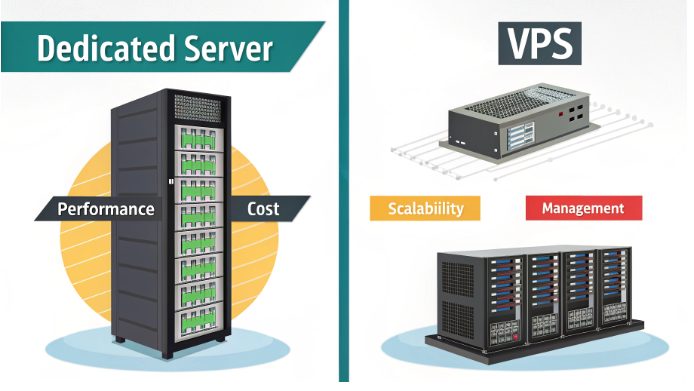US Dedicated Server vs VPS: The Right Choice for Business

In today’s digital landscape, choosing between a dedicated server and VPS hosting can significantly impact your business operations. This comprehensive guide dives deep into the technical aspects of both hosting solutions, helping tech-savvy professionals make an informed decision for their enterprise infrastructure.
Understanding Dedicated Servers: The Hardware Perspective
A dedicated server represents a single physical machine exclusively allocated to one client. This hardware isolation provides complete control over server resources and configuration options.
- Full access to CPU cores (typically ranging from 4 to 64 cores)
- Dedicated RAM allocation (32GB to 512GB)
- Custom storage configurations (SSD, NVMe, or traditional HDD)
- Direct network interface access
VPS Architecture and Resource Distribution
Virtual Private Servers operate on hypervisor technology, creating isolated instances within a physical server. Modern VPS solutions utilize KVM or Xen virtualization, offering near-bare-metal performance.
- Virtualized CPU cores with guaranteed resources
- Isolated memory segments
- Software-defined networking
- Containerized storage solutions
Performance Benchmarks and Technical Analysis
When evaluating hosting solutions, performance metrics provide crucial insights. Our benchmarking tests reveal significant differences in various workload scenarios.
- CPU Performance:
- Dedicated servers: Consistent performance with 100% resource availability
- VPS: 85-95% of bare-metal performance with proper resource allocation
- I/O Operations:
- Dedicated servers: Direct hardware access, achieving 100,000+ IOPS
- VPS: Variable performance, typically 20,000-50,000 IOPS depending on virtualization
Enterprise Security Considerations
Security architecture differs significantly between dedicated and VPS environments, affecting compliance and data protection strategies.
- Dedicated Server Security Features:
- Physical isolation eliminates hypervisor vulnerabilities
- Custom firewall rules at hardware level
- Direct implementation of security protocols
- Full control over security updates and patches
- VPS Security Implementation:
- Hypervisor-level security measures
- Virtual network isolation
- Shared hardware with secure partitioning
- Provider-managed security updates
Cost Analysis and Resource Scaling
Understanding the total cost of ownership (TCO) helps in making an economically sound decision while maintaining technical requirements.
- Dedicated Server Costs:
- Higher initial investment
- Predictable scaling costs
- Additional costs for hardware upgrades
- Optional colocation services
- VPS Expenses:
- Lower entry point
- Flexible resource scaling
- Pay-as-you-grow model
- Included infrastructure maintenance
Technical Use Cases and Deployment Scenarios
Different business requirements demand specific hosting configurations. Let’s analyze optimal deployment scenarios based on technical requirements.
- Dedicated Servers Excel In:
- High-performance database operations
- Big data processing environments
- Machine learning implementations
- Custom hardware configurations
- VPS Optimal Use Cases:
- Web application hosting
- Development and testing environments
- Microservices architecture
- Small to medium database operations
Infrastructure Management and Maintenance
Technical teams must consider the operational overhead associated with each hosting solution.
- Dedicated Server Management:
- Full root access and server control
- Custom kernel modifications
- Hardware maintenance responsibility
- Complete software stack control
- VPS Management:
- Simplified deployment procedures
- Provider-managed hardware
- Automated backup solutions
- Quick recovery options
Technical Decision Framework
Consider these technical parameters when making your hosting decision:
- Performance Requirements:
- CPU-intensive workloads
- Memory usage patterns
- I/O requirements
- Network bandwidth needs
- Scalability Needs:
- Growth projections
- Resource allocation flexibility
- Geographic distribution
- Load balancing requirements
Future-Proofing Your Infrastructure
Emerging technologies and evolving business needs require a forward-thinking approach to server infrastructure.
- Dedicated Server Evolution:
- ARM-based server architectures
- Advanced cooling solutions
- Green computing initiatives
- Custom hardware acceleration
- VPS Technology Trends:
- Container-native virtualization
- Edge computing integration
- AI-powered resource optimization
- Hybrid cloud capabilities
Implementation Best Practices
Success in server deployment requires adherence to industry best practices and technical standards.
- Initial Setup:
- Security hardening protocols
- Performance benchmarking
- Monitoring system implementation
- Backup strategy deployment
- Ongoing Management:
- Regular security audits
- Performance optimization
- Capacity planning
- Disaster recovery testing
Conclusion
The choice between dedicated servers and VPS hosting ultimately depends on your specific technical requirements, budget constraints, and growth projections. For resource-intensive applications requiring consistent performance and complete control, dedicated servers remain the optimal choice. VPS solutions offer an excellent balance of cost, flexibility, and performance for most business applications.
Whether you opt for dedicated server hosting or VPS infrastructure, ensure your choice aligns with both current needs and future scalability requirements. Consider factors such as performance benchmarks, security protocols, and maintenance overhead when making your final decision.

